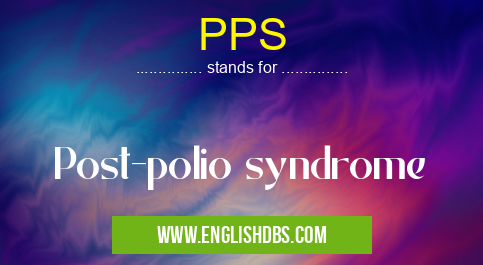What does PPS mean in REHABILITATION
Post-polio syndrome (PPS) is a condition that can develop in people who have had polio. PPS typically occurs decades after the initial polio infection and can cause a variety of symptoms, including muscle weakness, fatigue, pain, and difficulty breathing.

PPS meaning in Rehabilitation in Medical
PPS mostly used in an acronym Rehabilitation in Category Medical that means Post-polio syndrome
Shorthand: PPS,
Full Form: Post-polio syndrome
For more information of "Post-polio syndrome", see the section below.
What is PPS?
PPS is a late-onset condition that can develop in people who have had polio. It is thought to be caused by damage to the motor neurons that control muscle movement. This damage can occur during the initial polio infection or it can develop over time.
Symptoms of PPS
The symptoms of PPS can vary from person to person. Some of the most common symptoms include:
- Muscle weakness: This is the most common symptom of PPS. It can affect any muscle group, but it is most common in the legs and arms.
- Fatigue: People with PPS often experience fatigue, even after doing simple activities.
- Pain: Pain is another common symptom of PPS. It can be felt in the muscles, joints, or bones.
- Difficulty breathing: Some people with PPS have difficulty breathing. This can be due to weakness in the muscles that control breathing.
- Other symptoms: Other symptoms of PPS can include difficulty swallowing, speech problems, and cognitive problems.
Diagnosis of PPS
PPS is diagnosed based on a person's symptoms and a physical examination. There is no specific test for PPS. However, your doctor may order tests to rule out other conditions that could be causing your symptoms.
Treatment for PPS
There is no cure for PPS. However, treatment can help to relieve symptoms and improve quality of life. Treatment options may include:
- Physical therapy: Physical therapy can help to strengthen muscles and improve range of motion.
- Occupational therapy: Occupational therapy can help people with PPS to learn how to perform everyday activities in a way that minimizes pain and fatigue.
- Speech therapy: Speech therapy can help people with PPS to improve their speech and swallowing.
- Cognitive therapy: Cognitive therapy can help people with PPS to cope with the challenges of living with a chronic illness.
Essential Questions and Answers on Post-polio syndrome in "MEDICAL»REHABILITATION"
What is Post-polio Syndrome (PPS)?
PPS is a late-onset condition that can affect polio survivors years or decades after their initial infection. It is characterized by a range of symptoms, including muscle weakness and fatigue, pain, and difficulty breathing.
What causes PPS?
The exact cause of PPS is unknown, but it is believed to be related to the long-term effects of poliovirus infection on the nervous system. Over time, the virus may damage motor neurons, leading to muscle weakness. Additionally, changes in the immune system and hormonal balance may contribute to PPS symptoms.
Who is at risk for PPS?
Anyone who has had polio is at risk for PPS, regardless of the severity of their initial infection. However, the risk increases with age, and people who had polio as children or who had severe infections are more likely to develop PPS.
What are the symptoms of PPS?
Symptoms of PPS can vary widely, but common signs include:
- Muscle weakness and fatigue
- Muscle pain and tenderness
- Joint pain and stiffness
- Difficulty breathing
- Sleep disturbances
- Cognitive difficulties, such as memory problems
- Mood changes
How is PPS diagnosed?
There is no specific test for PPS. A diagnosis is typically made based on a physical examination, a review of medical history, and a discussion of symptoms. Your doctor may also order tests to rule out other conditions.
Is there a cure for PPS?
There is no cure for PPS, but treatments can help manage symptoms. These treatments may include physical therapy, occupational therapy, exercise, and medications.
How can PPS be prevented?
There is no way to prevent PPS, but getting vaccinated against polio can reduce the risk of developing the condition. The polio vaccine is safe and effective, and it is recommended for all children and adults.
Final Words: PPS is a condition that can develop in people who have had polio. It can cause a variety of symptoms, including muscle weakness, fatigue, pain, and difficulty breathing. There is no cure for PPS, but treatment can help to relieve symptoms and improve quality of life.
PPS also stands for: |
|
| All stands for PPS |
